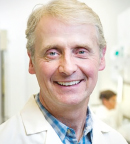
Edus H. Warren, MD, PhD
Immunotherapy researcher and oncologist Edus H. Warren, MD, PhD, has been selected to lead the Fred Hutchinson Cancer Research Center (Fred Hutch) program in Global Oncology in its effort to transform cancer care in sub-Saharan Africa, China, and other regions by providing greater access to the latest research and treatment.
Dr. Warren has been at Fred Hutch for 24 years, making important contributions in immunotherapy and global oncology. He designed and led Fred Hutch’s first clinical trial on T-cell therapy for patients with leukemia. More recently, he has concentrated on global oncology, and today about half of the research in his lab is focused on cancers that are particularly prevalent in Uganda, where Fred Hutch has a long-standing collaboration with the Uganda Cancer Institute (UCI).
The Fred Hutch program grew out of a small 2004 research project with UCI, which led to a formal alliance in 2008. In 2015, the UCI–Fred Hutch Cancer Research Centre opened in Kampala to house research, training, laboratories, and adult and pediatric outpatient clinical care.
Dr. Warren is active in the clinic’s research and treatment, traveling twice a year to Kampala and engaging in weekly Skype sessions to discuss cases with the UCI staff. He said he plans to visit the clinic more frequently and spend more time there with his new responsibilities.
As Program Head, Dr. Warren will lead the research program with UCI, which was initiated because of the high incidence of infection-associated cancers in the region, and now encompasses Kaposi sarcoma, Burkitt and other non-Hodgkin lymphomas, cervical cancer, breast cancer, and Hodgkin lymphomas. He will also spearhead collaborations between Fred Hutch and Chinese medical researchers that go back decades. Today, Fred Hutch’s China Initiative focuses on such health issues as infection-associated cancers, environmental exposures, immunotherapy, and cancer biomarkers for precision medicine.
“We produce breathtaking science on a daily basis here,” he said. “The problem is that much of the world’s population doesn’t have access to it. One of our major goals is to think outside the box, to figure out how we can adapt the incredibly exciting work that’s done here so it can benefit people all around the world.”
Training and Experience
Dr. Warren has a PhD in neurobiology from Harvard University and an MD from Harvard Medical School. He came to Seattle in 1993 as a medical oncology fellow at the University of Washington and a research associate in immunology at Fred Hutch. In the years that followed, he focused on understanding at the cellular and molecular levels how some, but not all, newly transplanted T cells attacked leukemia cells. He discovered a way to isolate the ones that did, multiply them in a lab, and give them back to the patient—a technique known as adoptive T-cell therapy.
Dr. Warren also co-invented a powerful, next-generation sequencing technology that allows researchers an unprecedented deep look at the millions of different T cells—and the diseases they target—in each individual person. ■

